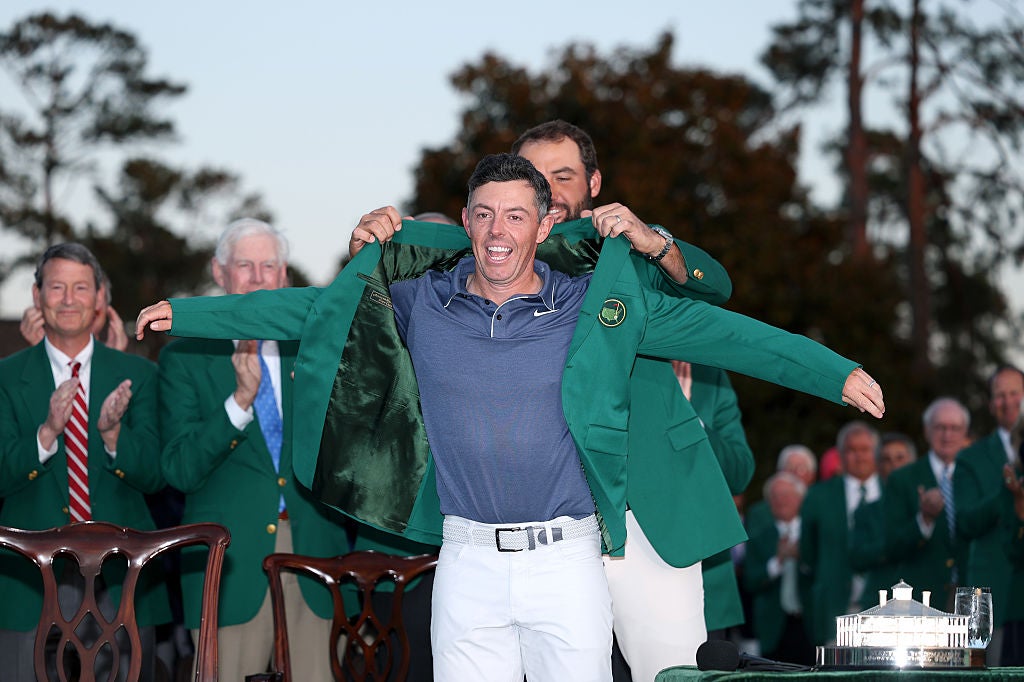One of the most important moments in Rory McIlroy’s historic victory at the Masters came before he had even hit a shot: at Augusta, he said, he was ready to have his heart broken all over again. After the ride he had been on in pursuit of the green jacket, and career grand slam, McIlroy reckoned he had already been through the worst of what his sport could throw at him, and it wasn’t so bad. “You dust yourself off and you go again,” McIlroy said last Tuesday. “I think that’s why I’ve become a little more comfortable in laying everything out there and being somewhat vulnerable.”
On Sunday, McIlroy’s acceptance of his vulnerabilities became his greatest strength in finally winning at Augusta. He had a five-foot putt to win the Masters, and missed. He faced the same nightmare and, in the moment that mattered, it made him stronger.
Returning to the 18th hole and facing Justin Rose in the play-off was another form of the torture McIlroy managed to put himself through over the previous four hours; on the 18th, he was required to hit the same shots on the same hole – he was forced to face his demons again.
But then, that was the story of McIlroy at Augusta, ever since he blew a three-shot lead and unravelled after the turn in 2011. At the age of 21, with jet-black curls spilling out from under his cap, the sight of McIlroy slumping over his driver after another errant drive into the murky depths behind Augusta’s pristine surface were the images that could have defined his prodigious talent. In another world, he never recovered.
The extraordinary, raw scenes of emotion as McIlroy fell to his knees after finally achieving the career grand slam were of relief and spoke of the burden he had been carrying. “That experience, going through the tough losses... I would say to [21-year-old McIlroy] just keep believing, just keep the course.”
He started his round with a double bogey on the first, a moment that he said actually helped his nerves. His lead over Bryson DeChambeau was overturned in a blink, but McIlroy steadied, and loosened: he was cackling to himself after finding a gap the size of the football through the trees on seven. The joy returned. A five-shot lead looked insurmountable, until the inexplicable on 13, dumping a chip into Rae’s Creek after laying up. Then, the shot of his life around the trees to reach the 15th in two, setting up an eagle chance which became a birdie to open the gap. He walked to his drive on the 18th needing par to win the Masters. His approaches had been meticulous all day, but this one somehow found the bunker. McIlroy appeared to have escaped trouble. He had a putt to complete the career grand slam and missed.
“The battle was with my mind and staying in the present,” McIlroy said. “My battle today was with myself.”
It was easy to see the mirror image of his entire career being reflected on his Sunday scorecard, with magic and disaster circling each other as if entwined in a dance. The past trauma of Augusta and final-day collapses fuelled McIlroy’s emotional sobs after the play-off. “I started to wonder if it would ever be my time,” he admitted.

At one point, it had appeared inevitable, In 2011, a few months after his first big disappointment at the Masters, McIlroy stormed to victory to win his first major. He won the PGA Championship in 2012 and the Open at Royal Liverpool in 2014, the year he won the PGA for a second time. At 25, with four majors and the most dominant player in the sport, the Masters was the only box left to tick. Instead, a drought followed, with near-misses and heartbreak at the majors shaping the road he travelled, where the next step would be all that mattered. He returned to the Masters year after year and faced the same questions. There were rounds of brilliance, with opportunities in 2018 and 2022, but putting together four days of consistency eluded him.
And at the other majors, a familiar pattern emerged. Whether winning another Open or US Open would have helped McIlroy’s pursuit of the green jacket is now immaterial, but there was a sense that the victories that slipped away so painfully at St Andrews in 2022 and at Pinehurst No 2 last summer were building into a mental block that would prove too much to overcome. He left Pinehurst without speaking to anyone following his defeat to DeChambeau at the US Open, where McIlroy missed two short putts in the final holes to blow another Sunday lead.
Those thoughts could have been swirling around McIlroy’s head at various points of the most dramatic Masters finale in recent memory. The key, though, was that the self-reflection had already been achieved. On the play-off, faced with the same shot up the hill on 18, McIlroy was ready for more heartbreak. He accepted it, and forgot about it, which is how he was able to take out his wedge, aim at the flag, and write a different ending.







